

Special 3D post! The cynical genesis of Captain America and why the title of the new film “Captain America: The First Avenger” should be changed in every territory
Here is what you call a “non-story:” The upcoming film “Captain America: The First Avenger,” will be dropping the “Captain America” part of the title when it is released in South Korea, Russia, and Ukraine.
The choice was made by Marvel, Paramount Pictures’ international team and distributors in those three countries based on market research results. Those involved in the decision are being careful to frame the move as a matter of brand management and consumer awareness and not as a decision tilted by cultural or political winds.
In private, Marvel insiders said that early on in the project’s planning there was talk that the title might need to be changed in numerous international markets but that there was a ”pleasant surprise” — the brand recognition of the comic-book superhero was so strong that it overrode those considerations in many places. That was not the case in Russia, South Korea and the Ukraine.
Most Americans don’t care what happens in any of those three countries, anyway. I’m not entirely sure that “Ukraine” is even a real place. Show it to me on a map. I’m waiting.
As the article points out, it’s not all that uncommon for American films to change their titles for overseas release. Here is a list of 50 particularly amusing changes. Among my favorites:
In Japan, “Being John Malkovich” became “The Hole Of Malkovich.”
In Mexico, “Thelma and Louise” became “An Unexpected End.” (Shouldn’t they have called it “Spoiler Alert”?)
In France they really cut to the heart of things when they changed the title of “The Matrix” to “The Young People Who Traverse Dimensions While Wearing Sunglasses.” (A case of the title being better than the actual film.)
In China, “Leon” (which was actually called “The Professional” when I saw it here in the United States) became “This Hit Man Is Not as Cold as He Thought.”
But my favorite might be another from China, when they changed the title of “Risky Business” to “Just Send Him To University Unqualified.” Doesn’t that just sound like something a “Tiger Mother” would say, throwing her arms up in exasperation?
“He doesn’t want to study the violin? Well then why not just send him to university unqualified???”
I have gone a bit off-topic, but my point is that this isn’t exactly a big deal. In three territories overseas they are changing the name of a film. A measly three territories. When I first read this story I yawned. Someone who did not yawn when he read this story, someone who was in fact filled with righteous indignation when he read this story, was a fellow called Warner Todd Huston over at the Big Hollywood site. He sees the dropping of the words “Captain America” from the title as nothing less than a neutering of the very spirit of Americanism that infuses that which is most noble about all our most noblest impulses, or something. I am paraphrasing, but only slightly.
Apparently, Hollywood thinks a character called “Captain America” is too gauche for foreigners to handle. And so he’s to go nameless in such places as Russia, Ukraine, and South Korea. Once again, Hollywood shows that it’s ashamed of America, its traditions, and culture.
“Gauche” sounds like a French word to me. Like “foie gras.” I love foie gras. It is my favorite food, next to the McRib. I live in two worlds — the gauche and the elegant. Anyway, the use of the word “gauche” is a deliberate choice meant to inflame anti-anti-American sentiments. It almost worked on my loves-McRib side. But then the part of me that loves foie gras rose up and said, “Don’t take the bait, he’s baiting you!” (But he said that in French, which is why it took a second to understand him.) Also, he’s trying to get my goat. I like goat meat, too. By which I mean lamb. I’m not sure I’ve ever eaten goat meat. I’ve had goat’s milk. I’m pretty sure that was goat’s milk. Anyway, I’m getting off-topic again.
The giant monolith that is “Hollywood” might be ashamed of America, its traditions, and culture, but in this case, “Hollywood” is displaying its interest in that most delightful and American of traits, making lots of scratch by tailoring its product to fit the desires of the consumers.
Again, don’t forget that we’re talking about three measly territories. (I don’t mean to in any way denigrate the territories themselves by calling them “measly.” I’m denigrating the number “three.” I have always hated the number three. Specifically, I hate it when people say things like, “That always happens in threes,” when referring to deaths or bad news or whatever. It’s just not true!)
But back to Big Hollywood:
This film already raised eyebrows for patriots when the director said that his Captain America wouldn’t be that into America. Last July, director Joe Johnston claimed that the Captain America in his film would not be a “jingoistic American flag-waver.” Johnston’s anti-American sentiment foreshadows the dropping of the character’s name from the title for overseas distribution.
“Patriots” act in as monolithic a way as “Hollywood.” Raising their eyebrows over the treatment of a comic book character in a motion picture. Apparently because Captain America won’t be a “jingoistic American flag-waver,” the film is somehow “anti-American.”
It’s one or the other, dammit. “If you don’t love it, leave it,” to borrow a phrase that originated with Merle Haggard.
I’d dare say that the new costume they designed for the captain of that unmentionable nation was created in an effort to mute the essential American-ness of its traditional comic book design, too. Not that the uniform looks ridiculous by any means. In fact, it edges toward the practical instead of the generally outlandish nature of most comic book costumes (including the original Cappy’s costume).
But the thing is the original Captain America costume is unmistakably a replication of the U.S. flag.
Okay, I shall stop cutting and pasting from the article. You get the idea. But I might as well address the “issue” of the movie costume’s “muting of the essential American-ness of the traditional costume design.” I shall do this with indisputable historical facts and a careful examination of the costumes in both the comic books and images released from the film.
First, Captain America, the comic book superhero:
Eye-catching. My foie gras-loving side appreciates the use of the colors of the French flag in its design. And now, here is an image of Mr. America from the upcoming film:
First of all, I have to confess that I am a very straight man, but my line of vision goes right to Mr. America’s crotch every time I look at that picture. Second of all, I guess that Mr. Huston has a point about them changing the uniform. That thing just looks cheesy. But, again, who is looking at the stars and stripes above the belt, when there’s so much going on below it?
Oh wait hold on a second. That is a shot from the 1979 Captain America TV movie. Here’s an image from the upcoming Captain America film:
I think we can all agree it’s a vast improvement over the 1979 TV movie version. It also matches pretty closely with the comic version. As closely as a live-action film that’s going for a “serious” treatment of the character can be expected to get.
Still, there is a strap that crosses over the star on Captain America’s chest. What is he trying to hide? That he’s a beacon of light, a northstar-like guide for other countries? Also, why isn’t Captain America looking directly at the camera in that shot?
A real American faces forward at all times. Showing the (comic book superhero) symbol of liberty looking off to the side is just another example of “Hollywood” elevating irresolution above grit, determination and forward-thinking. It’s a wonder Captain America isn’t looking at his navel in this shot, am I right? Did our founding fathers ever allow their gaze to stray to the side while they were writing all those great documents on which our country is founded? Nope.
Anyway, let’s travel now back in time, to early 1941, and the creation of the character. In his book The Comic Book Makers, Joe Simon, the creator of Captain America writes,
“Our government’s propaganda was preparing us for the day when the U.S. would enter the war. It was time of intense patriotism. Children played soldiers, shooting war toys at imaginary Hitlers. Wouldn’t they love to see him lambasted in a comic book. By a soldier. A meek, bumbling private with muscles of steel and a colorful, star spangled costume under his khaki uniform. Wouldn’t we all!
…[M]y mind burned with the idea. This was an opportunity for big money if I could make the right deal, not to mention the chance to make a mockery of the Nazis and their mad leader.” (p. 50)
Emphasis added because Captain America, that glorious beacon of liberty and essential American-ness, was created as a cynical attempt to cash in on a rising tide of pro-war sentiment by becoming part of the government’s propaganda machine.
Cashing in on war. There’s your “essential American-ness,” Mr. Huston.
Not only that, but advertisements within the comic book encouraged young readers to “become a sentinel of liberty” by joining a “noble crusade against spies, fifth columnists, and traitors to the United States of America!!!” Informing on neighbors who might be acting in a suspicious way — if you see something, say something.
Captain America was created as an attempt to help push official government policy, and make money. Something he’s still doing. Check out these pages from Captain America issue number 602, which was published back in February 2010:
Captain America takes on the Tea Party. The Tea Party, which is diametrically opposed to current official government policy. In case you forgot what I wrote in the previous paragraph, allow me to restate it for dramatic effect: Captain America was created for the specific purpose of pushing government policy. Captain America is still being used for that purpose. I wonder how Mr. Huston feels about that?
Actually, I don’t have to wonder, since Mr. Huston covered the Captain-America-takes-on-the-Tea-Party issue on his website, Publius’ Forum (which is where I got the above scan).
Isn’t it wonderful that a decades old American comic book hero is now being used to turn readers against our very political system, being used to slander folks that are standing up for real American principles in real life — and one called “Captain America” at that?
When he says “isn’t it wonderful,” he’s being ironic, but I get his point. I can be ironic, too, sometimes.
The president at the time of Captain America’s creation was Franklin Roosevelt. The guy who gave us “The New Deal.” The guy who was at the head of a government that was, according to Joe Simon, “preparing us for the day when the U.S. would enter the war.” A guy who is often compared to the current president:
Captain America is agitprop. Not American agitprop — government agitprop. His highly questionable genesis is mirrored in his incredibly suspect origin story. Here are some scans from a 1983 comic strip that was included with the Hardee’s equivalent of Happy Meals. I think it was Hardee’s; my memory is almost as bad as Stan Lee’s. Anyway, if you’ve got 3-D glasses at home, you can view these images in eye-popping and nauseating 3-D (cashing in on a fad is also part of our essential American-ness):
Okay, Steve Rogers volunteers for an experiment in which he’s given an injection of a performance-enhancing drug that will make him stronger than most human beings and give him an unfair advantage in a competitive environment. If a baseball player does this he’s vilified. But if a fictional character meant to embody our essential American-ness does it, then he’s an aspirational figure?
Would the people have still considered him heroic, if they’d known how he cheated to get that amazing physique? Think of the cynicism behind this — that greatest superhero of all, Popeye, had a message that was always mind your mother, work hard, exercise, and eat your vegetables, specifically your spinach. Captain America says, “Screw that, there’s a shortcut.” Hard work doesn’t mean anything. Take a drug, cut to the front of the line.
Then go to sleep for about ten years — because superheroes have gone out of fashion, and your comic’s not selling anymore. In other words, when you’re losing, just give up.
Sure, he finds a way to come out on top — by cheating. Remember, he took that supersoldier serum. His “victories” are always tainted. Like that baseball player who took those steroids, and everyone said that his big home run record didn’t count. I don’t know his name because I don’t follow sports, but you probably know who I’m talking about. Why should anyone look up to Captain America? All he did was take a drug —
–And it’s not like it was in the case of Spider-Man, who was bitten by a radioactive spider, or when Bruce Banner was caught in that nuclear blast and became the Hulk. In this case, Steve Rogers volunteered to cheat. He knew what he was doing when he took that drug. He was willing to risk death, if it meant he wouldn’t have to exercise to get a great body.
A powerful message of American-ness.
And by the way, what kind of message is “take your drugs like the guy from the government tells you to?” How does Mr. Huston feel about ObamaCare?
This is the greatest panel of the entire strip. First of all, Steve Rogers was a freelance artist at the time this strip came out? Are you serious? Superheroes are supposed to be wish-fulfillment fantasies but for crying out loud that is too much. A superheroic freelance artist! If he were going to be a symbol of American-ness, shouldn’t he be an entrepreneur or something?
Oh, and his motorcycle was especially designed for him! First he gets a designer body, then he gets a designer bike — with a star on the side of it! Do you think, as a freelance artist, Steve Rogers painted that star himself?
Yes, if the American dream is to cheat, and unquestioningly accept what the government tells you.
This cynical character, created as government agitprop, in somehow a symbol of American-ness. Dropping the words “Captain America” from the film’s title in three overseas markets is somehow indicative of the idea that the creators of the film are ashamed of “America, its traditions, and culture.”
Let me tell you something, if Captain America represents America, its traditions, and culture, then I am ashamed myself, and I don’t want this guy’s name to be in any way associated with me. He’s not my Captain!
And just in case you are still on the fence after reading my powerfully moving arguments, I will leave you with the following, taken from the first volume of Marvel’s Essential Captain America collection.
Ever wonder what superheroes do in their time off? “Tales of Suspense” number 82, cover dated October 1966, gives us the answer — at least for Captain America. He hangs out in the Avengers mansion, looking over old photographs of himself from World War II. Then he has some tea, provided by the Avengers’ butler, Jarvis.
Typical American.
You’ll note that Captain America is hanging out in full costume. Why must he be wearing his super suit when all he’s doing is looking through old scrapbooks and drinking tea?
Answer to your stupid question: He is a superhero. He is always “on duty.”
Anyway, it’s the third panel that gives us our most revealing glimpse into the mind of the super hero. Captain America is so bold, so powerful, so downright goshdarnit honest that he tells Jarvis exactly what are his plans.
I’m going to go masturbate in the shower.
He’s a little more subtle than that, but not much. I’ll just take a shower— single-handed. The emphasis on the word “shower” is telling. It’s the verbal equivalent of a wink at Jarvis. You know what I mean by shower, Jarvis. And just in case you don’t, I’ll throw in the totally superfluous line about doing it “single-handed.”
I’m not judging Captain America; he’s a superhero and he probably has a hard time building romantic relationships. There is a limited pool of super women from which to draw, and if a superhero mates with a “normal” woman, well, as Larry Niven famously postulated in “Man of Steel, Woman of Kleenex,” the results could be disastrous for the woman. And of course, we all masturbate in the shower. But do we announce it to the butler before we trudge off wearily to do it?
That’s just part of what makes Captain America one of our greatest heroes — one that represents our unique American-ness. He gets bored, he goes to masturbate. And he’s secure enough to tell whoever happens to be around.
I’m going to masturbate in the shower.
Excelsior, Captain America!
Latest posts by Ricky Sprague (Posts)
- Meet the start-ups that are thriving in the current economic recovery - May 27, 2016
- How a Wonder Woman comic from 1942 led to the Great California Cow Exodus of 2012, maybe - November 28, 2012
- A common-sense approach to restoring economic prosperity - November 19, 2012
- New Philip K. Dick novel too absurd to be believed - September 17, 2012
- My 90 Days, 90 Reasons submission - September 12, 2012
 Print This Post
Print This Post

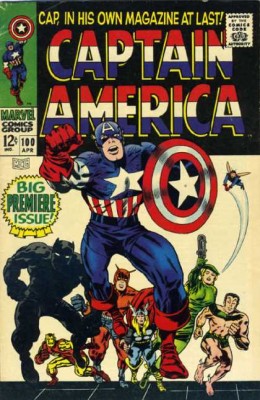
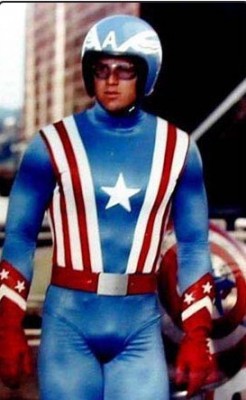
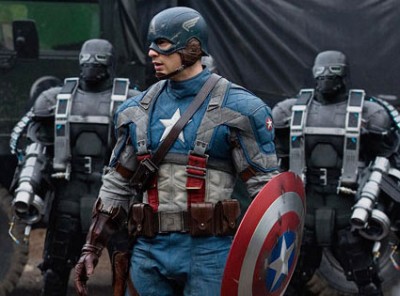
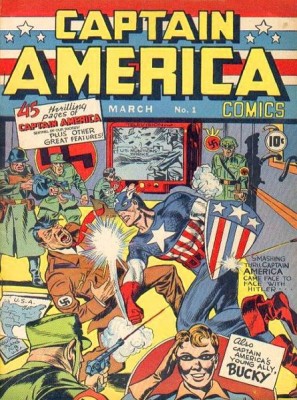
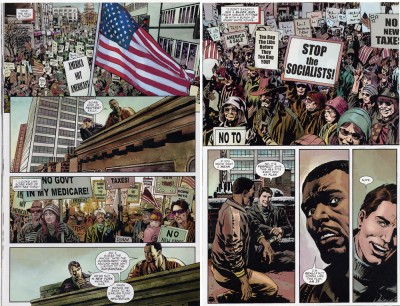
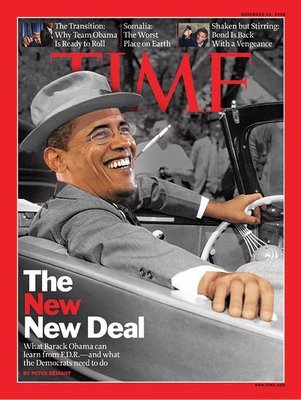
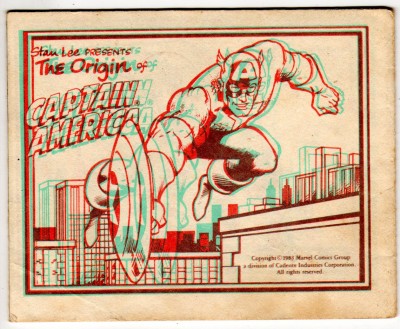
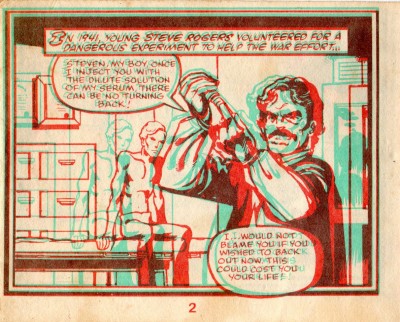
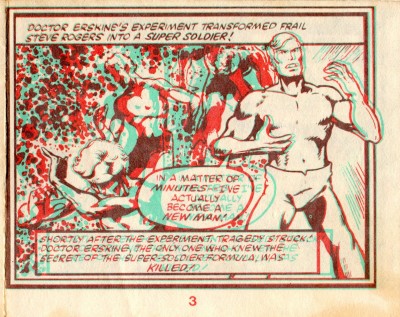
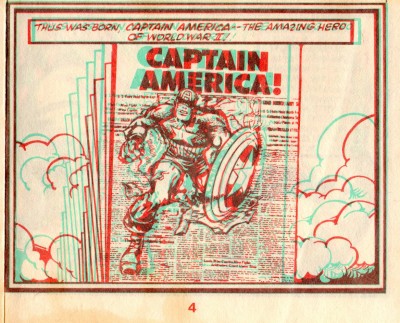
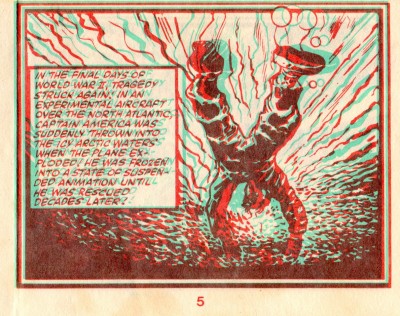
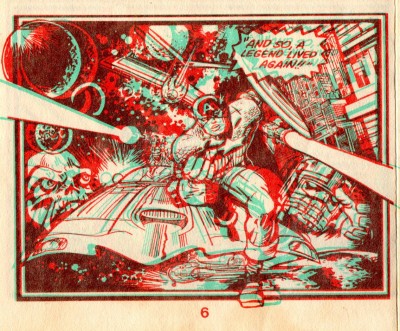
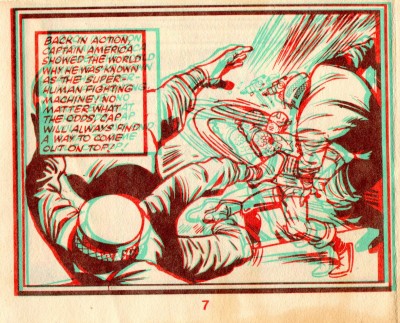
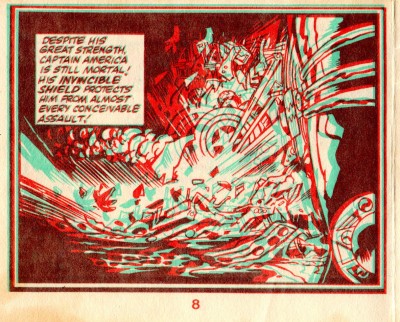
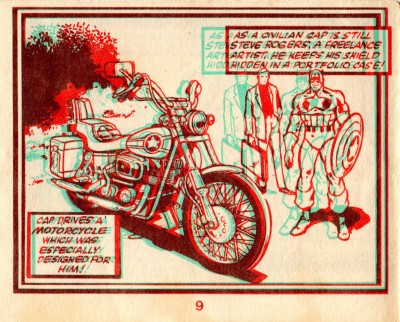
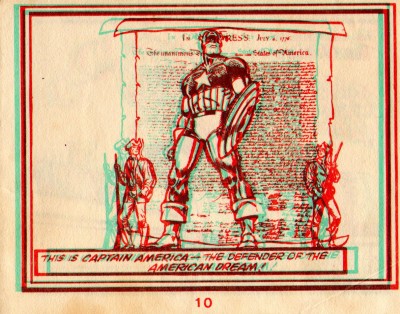
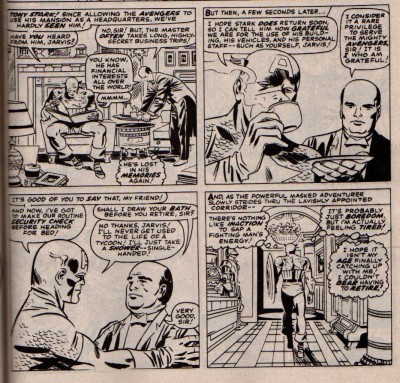



Still, as you walk through the airport in Seoul, you can’t help but consider what the average Joes and Janes walking by owe the American GIs who kept that country from being absorbed by the Norks 60 years ago. Not that the average 30-something South Korean knows that. But the 60-somethings, who were there as kids, know it.
And the idea that Captain America is unwelcome in South Korea is just a little unsettling. I’d expect it in Russia, but for the South Koreans to force a renaming, I find that troubling.
Let’s also not forget that in the mid 80s Cap had a black assistant he called ‘Bucky.’
… I still remember Mark Gruenwald’s panicked apology in the letters page a month or two after the new “Bucky” premiered. His name was swiftly changed.
Can’t remember if I’ve shared this sick image before, but it speaks to the Cult of Sexual Perversion and Deviant Behavior that is Marvel Comics:
http://bit.ly/i7MJ2u
@Daniel K — I completely forgot about the whole Lemar Hoskins-Bucky-“Bold Urban Commandos”-Battlestar brouhaha.
But let us not forget: Captain America represents a country (a) whose Constitution originally claimed that some people only qualified as 3/5 of a human; (b) broke all of those treaties with the Native Americans; (c) whose president at the time of the Captain’s creation locked people up because their ancestors were Asian; (d) fights a “war on drugs” that has disproportionately affects people of color; (e) that has the “PATRIOT Act”; and (f) everything else that I don’t like or find disappointing about America.
What more can we expect from such a character?
@Michael C: Did the issue in which that image appeared carry the seal of approval of the Comics Code Authority?
God I loved this. I just ROARED with laughter! Brilliant.
Not to be that guy, or anything, but the 3/5 clause was a compromise between the northern states, who wanted slaves to count as 0/5 of a person, and the southern states, who wanted slaves to be counted as 5/5.
Alex,
You do realize that the Southern solution was NOT BETTER for slaves at all, right? Because the census helped apportion the amount of representatives each state received in the House of Representatives, to allow slaves to count as a “whole person” for determining representation in Congress, while simultaneously treating them as property and denying them the right to vote, meant that slaves would be “represented” in the national legislature by representatives that were voted upon by their white, male slaveowners. It would have been far better had the national presence of the slave-owning South been reduced by not counting for the purposes of national representation those that the South deemed to be non-persons.
(Which is, of course, not to apologize AT ALL for the pervasive racism that existed all over the North, including in national politics.)
If there were going for movie representation of Captain America then why bother altering the title itself then? They should’ve learned from the countless number of Comics-turned-Movies that have aired throughout these years.